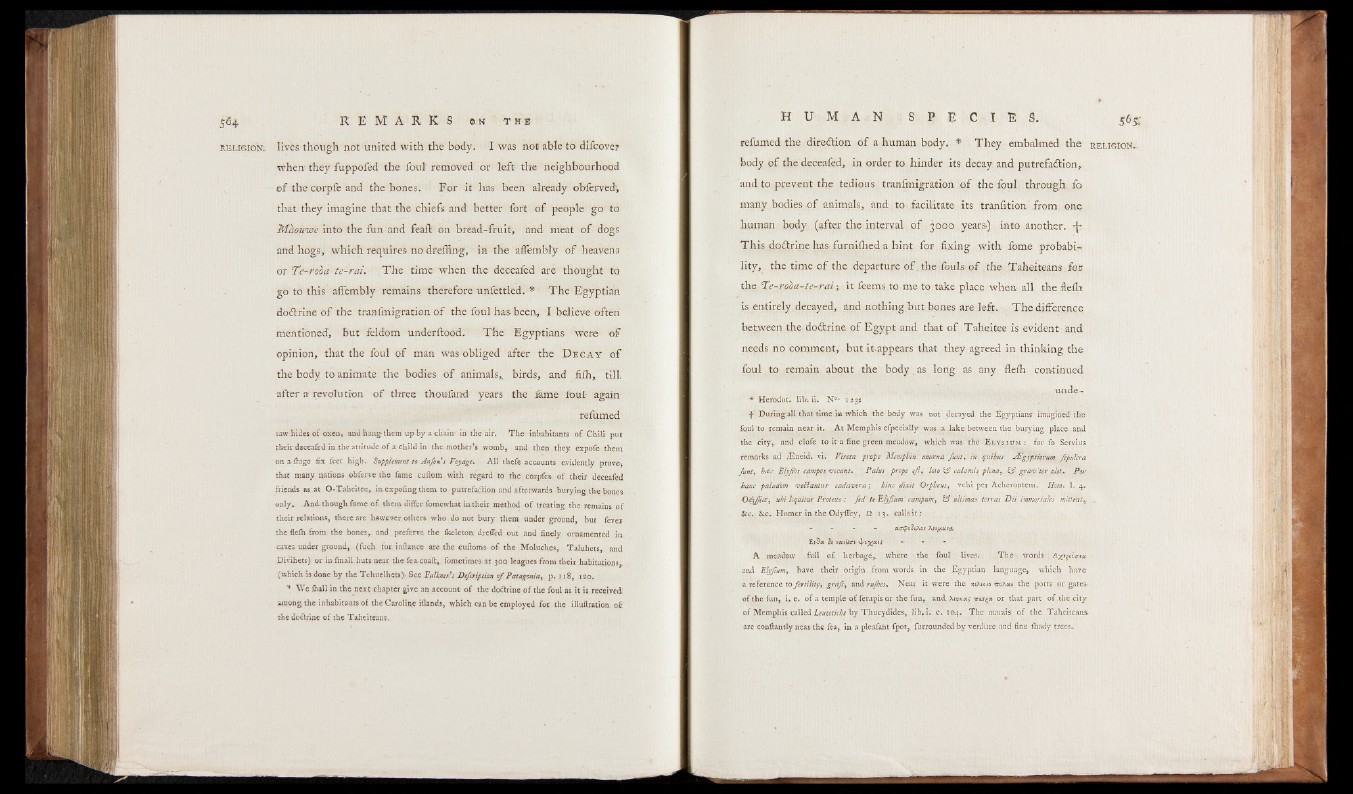
5 <H
RELiaiok.
R E M A R K S e m t h e
lives though not united with the body. I was not able to difcove?
when- they fu-ppofed the foul' removed or left the neighbourhood
e f the corpfe and the bones. For it has been already oblervedy
that they imagine that the chiefs and better fort o f people go to
Maouwe into the fun and feall on bread-fruit, and- meat o f dogs
and hogs, which requires no drelfing, in the alfembly o f heaven3
or Te-f’ooa te-rai. T h e time when the deceafed are thought to
go to this affembly remains therefore unfettled. * Th e Egyptian
dodtrine o f the tranfmigrat-ion o f the foul has been, I believe often
mentioned, But feldbm underftood. T h e Egyptians were o f
opinion, that the foul o f man was obliged after the D e c a y o f
the body to animate the bodies o f animals,, birds, and filh, till
after a revolution of three thoufand years the feme foul- again
relumed
raw hides of oxen-, and hang-them' up by a chain- in the air. The inhabitants o f Chili put
their deceafed in the attitude of a child in the. mother’s womb, and then they expofe them
on a-fiage fix feet high. Supplement to Anfort s Voyage. All thefe accounts evidently prove*
that many nations obferve the fame cufbom with regard to the coEpfea of their deceafed
friends as at O-Taheitee,. in, expofing them to putrefaction and afterwards burying the bones
only* And. though fome o f them differ fomewhat in-their method of treating the remains of
their relations, there are however others who do not bury them under ground, but fever
the flelh from the bones,, and preferve the fkeleton dreffed out and finely ornamented in
caves under ground, (fuch for. in fiance are the cuftoms of the Moluches, Taluhets,. and
Divihets) or in-.final 1 huts near the fea,coaft,. fometimesat 300 leagues from their habitations
(which is done by the Tehuelhets). See Falkner’s Defcriptian of Patagoniap. 118, 120.
* We fhall in the next chapter give an account of the doClrine of the foul as it is received
among the inhabitants of the Caroline iflands, which can be employed for the illuftration. off
the doftripe of the Taheiteans,
H U M A N S P E C I E S . 565;
refumed the direftion o f a human body. * Th e y embalmed the relision.-
body of the deceafed, in order to hinder its decay and putrefaflion,
'and to prevent the tedious tranfmigration o f the foul through fo
many bodies o f animals, and to facilitate its tranfition’ from one
human body (after the interval o f 3000 years-) into another. +_
This dodtrine has furnilhed a hint for fixing with fome probability,
the time o f the departure o f the louls o f the Taheiteans for
the Te-rooa-te-rai; it feems to me to take place when- all the flelh
is entirely decayed, and nothing but bones are left. The difference
between the dodtrine of Egypt and that o f Taheitee is evident-and
needs no comment, but it.appears that they agreed in thinking the
foul to remain about the body , as long as any flelh continued
unde-,
* Herodotr lib. ff. N°- 123J
f During all that time i-n which the body was not decayed the Egyptians’ imagined the
foul to remain near it. At Memphis efpecially was a lake between the burying place and
the city, and clofe to it a fine green meadow, which was the El y s ium: for fo Servius .
remarks ad yEneid. vi. Vireta prope Mempbin' otneena funt, in quibus JE'gyptiorum fepulcra
Junt, here Elyjtos campos- vacant. Palus prope ejl, loto & calami* plena,. £ff grav'.ter oht* Per
banc paludem veSlantur cadaver a', bine dixit Orpheus, vehi per Ache rontem. Horn. 1. 4.
Qdyjfea?, ubi Icquitur Proteus : fed' teTLJyJium campunt, & 'ultimas terras Dii immoytales mittent,
Zee. &c.. Homer in the Odyffey, J2 13* calls it.r
- - - - ctatyooiKav Mifturct,.
E»Sec Us yctiiscri -^.v^aiS - -
A meadow full o£ herbage,, where the foul l i v e s T h e - - words ; A^oijtnx
and Elyfium, have their origin from words in the Egyptian language, which have
a reference to fertility, grafs, and rujhes, Near it were the »jtAioio nvXca the ports or gates- -
of the fun, i*e. of a temple of ferapis or the fun, and, favKus irvr^a. or that part of.die .city
of Memphis called Leucoticbe by Thucydides, Jib. i. c. 104. The marais o f the Taheiteans?
are conftantly near the fea, in a pleafant fpot, furraunded by verdure and fine fiiady trees»